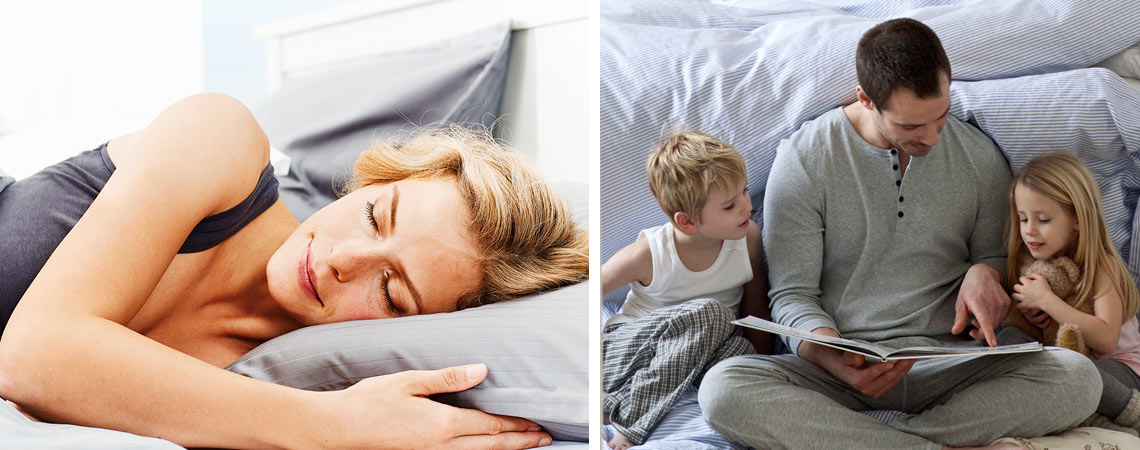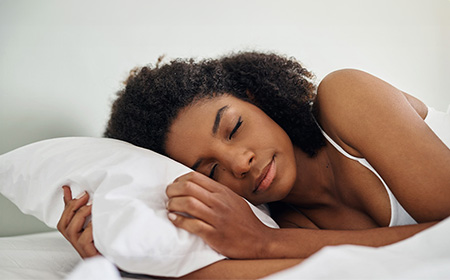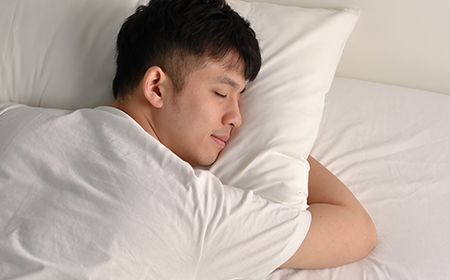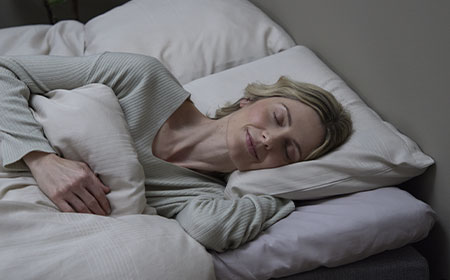Experts in sleeping culture
From 1979, when our first store opened in Aarhus, Denmark, JYSK has enjoyed a worldwide reputation for expertise and knowledge in sleeping culture, which continues to this day.
What are great tips for falling asleep quickly?
Did you know that we sleep approximately 1/3 of our lives? Our sleep is therefore an essential part of our overall wellbeing.
Sleep and health are very closely related. Sleep is an important factor for your health, hence why good sleep is so crucial. Very few people are aware of the consequences that insufficient sleep can have on your body. When you sleep your body recharges your energy supply, this is why getting a good night’s sleep is vital. You totally disconnect from your body, so it can recoup after a hard days work. Sleep is very positive for our bodies in many different ways. Not only can our level of concentration improve, but so can our overall mood and general well being. There are different tips, techniques and methods that you can use, if you want to avoid tossing and turning at night. Lying awake when you really want to sleep is frustrating and can damage your health, therefore we have gathered 10 efficient tips that will help you fall asleep quickly.
1. Get into a routine
Body and mind love it when you lead a life that is the same day to day. Go to bed and get up at the same time every day and this will do wonders for your body’s internal clock. Take the routine even further and create a ritual that you repeat day after day to let your body know that you are approaching bedtime. Doing the same things night after night will tell your body that it’s time to settle down.
Here is an example of a routine day:
- 7:30 p.m: Stop exercising.
- 8:30 p.m: Make a list of to dos for the next few days and write down anything that ia bothering you. This way you will empty your brain which allows you to concentrate on other things, like sleeping!
- 9:00 p.m: Dim the light. No more drinks or food.
- 9:30 p.m: Turn off all electronics, go to the bathroom and take a warm shower. (We know how distracting our phones can be)
- 10:00 p.m: Go to bed and read a magazine or a book. Listen to calm music.
- 10:30 p.m: Lights off.
2. Your sleep environment
How can your bedroom design support your efforts to fall asleep? There are different ways: - Keep it quiet, cool, and dark.
- Make sure that your bed linen is clean and inviting. There is nothing better than falling asleep in fresh, crisp bed linen!
- Minimise clutter: Clean up your bedroom and avoid using it for storage or as a workspace. This will give you a sense of peacefulness and calmness
3. Make your body relax
How do you make your stressed body relax and ready for bed? There are at least a couple of options: Get your body to relax with a nice warm shower. The hot shower will result in your body cooling down afterwards – which again creates a drowsy feeling.
Also, when in bed, perform a body-scan, where you travel through your entire body in your mind. Start with your toes, work your way up the foot to the ankles, lower legs, knees, and so on. Do the same for your back. This relaxes the body and some people experience falling asleep before they are done.
4. Breathing exercises to help you sleep
How can your breathing help your fall asleep? Below you will find 3 different techniques that may do the trick:
1. The 4-7-8 technique
This technique was developed by US sleep expert Dr Andrew Weil and is said to make you fall asleep within 60 seconds. Here is how you do it:
1. Keep the tip of your tongue behind your upper front teeth
2. Exhale through your mouth making a “whoosh” sound
3. Inhale through your nose while counting to 4
4. Hold your breath while counting to 7
5. Exhale through your mouth while counting to 8, making the “whoosh” again. When your reach 8 all air must have left your lungs
6. Repeat no more than 4 times
This technique allows your lungs to fully charge with air and allows more oxygen into your body. This again promotes a state of calmness.
2. Concentrate on your breath
Concentrate on your own breathing and about the feeling of your chest raising and falling. Concentrate on the places on your body where you feel that you are inhaling and exhaling: Lungs, nose etc.
3. Yawn even if you don’t have to
We yawn when we are tired, but even if you don’t feel tired, doing a good yawn might get you in a sleepy state. By yawning, you will feel an increasing tranquility in your body.
5. Think happy thoughts
Why is it difficult to fall asleep in the first place? For lots of people the reason is stress and worry. You need to relocate your negative thoughts to during the day when you can actually act upon them. Save the time before falling asleep for happy thoughts. How you do that? One possibility is to use a notebook and take 15 minutes to write down anything that is bothering you. This way you clear your mind and you may even find a solution.
6. Listen to calming music or natural sounds
Sleep is a topic that gets a lot of publicity these years. Numerous sleep apps for our smartphones promise to help us forget our worries so we can fall asleep. You can read stories designed to make you relax enough to drift off. There are calming sleep music play lists that can help us calm down, you can listen to podcasts centered on sleep and you can monitor your sleep with a sleep tracker that supervises the amount of time you spend asleep, your sleep quality etc.
Some people find it relaxing to listen to calm music or natural sounds like birds singing or waves crashing on the beach. See if it suits you and helps you get into the right sleepy mode.
7. Count backwards
Does counting sheep help you fall asleep? Sometimes it will, but some people need a task that is a bit more challenging. Try subtracting 3 from a given number on a continuous basis. Example:
300-3=297
297-3=294
294-3=291
Etc.
8. Natural herbs and other remedies
There are different kinds of food and beverages that will make you drowsy. Warm milk, bananas, grapes, cherries, almonds, walnuts and camomile tea are supposed to have a calming effect. Unless you have an allergy, you can try them and see if they help you fall asleep faster.
You probably already know that coffee and other caffeinated drinks make it difficult to fall asleep. But did you know that you should stay clear of them for at least 4 hours before bedtime? Also avoid drinking water the last couple of hours before bedtime and avoid alcohol as it has a negative effect on the quality of sleep.
9. Lights out
The absence of light sends a signal to the body that it is time to rest. Darkness stimulates the production of the “sleep hormone” melatonin. Melatonin makes you feel less alert, and sleep becomes more inviting when it has entered your blood. Red light resembles the light from a sundown and it will put you in a state ready for bed. On the contrary, blue light like the one from your TV, tablet, or smartphone will wake you up, so avoid these.
10. Act upon your sleeplessness
What do you do if you have been lying awake for 15 minutes or more, without being able to sleep? You should get up. Tossing and turning only leads to unhappy thoughts about not being able to fall asleep, and you should really associate your bed with calmness and happiness. Get up and do things that you find relaxing like reading a book or listening to music (still avoid screen light from electronic devices). Accept that you are having a hard time falling asleep, and take action in due time instead of only around bedtime.
Sources
https://www.nosleeplessnights.com/sleep-hygiene/bedtime-routine-for-adults/
https://sleep.org/articles/design-perfect-bedtime-routine/
https://www.drweil.com/videos-features/videos/the-4-7-8-breath-health-benefits-demonstration/
https://www.tuck.com/thermoregulation/




